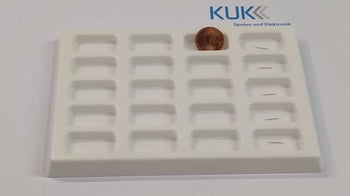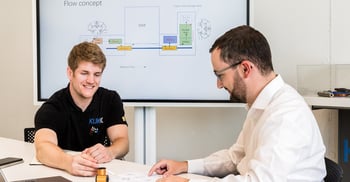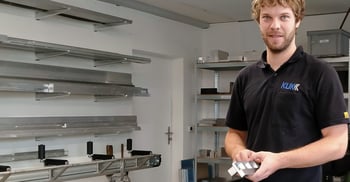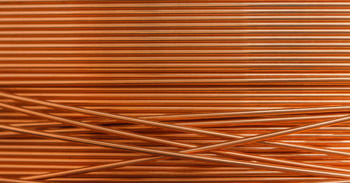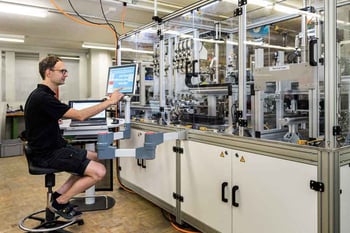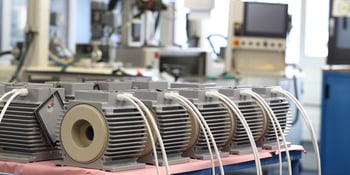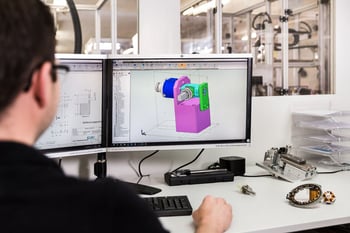As an automation engineer I have found my dream job
Gabriel Scheifele is one of the KUK engineers who has moved his workplace to the new Technology Centre in Appenzell (Switzerland). What the automation engineer appreciates about his work - designing machines - is the great variety, the high level of responsibility and the short decision-making processes.
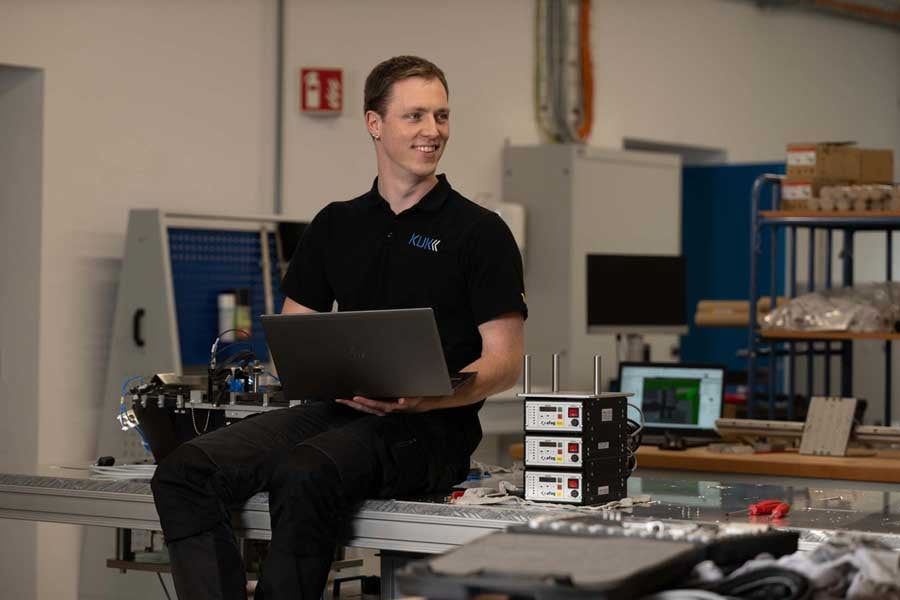
Gabriel Scheifele has been working at KUK for two years: "After my apprenticeship as an automotive mechatronics engineer for commercial vehicles, I attended military service school. Then I completed the vocational school with a specialisation in technology and followed it up with a systems technology degree at OST – Ostschweizer Fachhochschule," he explains. "When I saw the job advertisement from KUK in autumn 2020, it was made for me." He had already been very interested in robotics and automation during his studies, so the position as automation engineer was a perfect fit.
From A to Z from Appenzell
"Many companies are looking for pure designers, not mechanics. But that's exactly what was interesting for me - we can screw together our own machines here." That's why Gabriel also chose to specialise in mechanical engineering during his studies; developing and building complete machines has always been his thing.
"We do everything ourselves from A to Z, from conception and design to documentation and training for operation and maintenance."
Gabriel can still remember "his " first machine for KUK: "That was a studding machine, which is now in use in Appenzell." Many of the machines developed in-house also go out all over the world, where KUK is represented with seven locations. So every custom coil produced by KUK is also a little "Made in Appenzell" - regardless of whether it is manufactured in Europe, Asia or Africa.
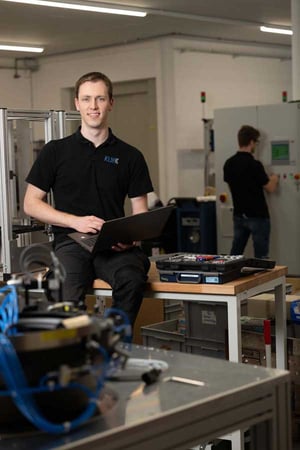 Convert or build a new production line for coils?
Convert or build a new production line for coils?
But KUK does not build a separate machine for every solenoid coil, does it? Gabriel Scheifele denies it: "The management does a triage for every order: can an existing machine be adapted or converted for this purpose - or does a new one make more sense?" Once the decision for a new design has been made, the customer, the KUK product manager and CTO Stefan Dörig draw up specifications that include budget, cycle times and output. Next, the engineers conceptualise the order. Then the actual design phase begins, in which the individual system modules are manufactured and finally connected.
"Of course, the flat KUK hierarchy comes in handy here," says Gabriel. The short distances between the different teams, but also to the management, help to ensure that orders can be processed quickly and without loss of information. "I really appreciate that we get a lot of trust on the one hand, and great support from all the teams on the other."
On the pulse of the winding industry
Automation and robotics are areas that are developing at high speed. How do you manage to stay up to date here? "We educate ourselves externally, for example with partners, and internally, and also keep our finger on the pulse thanks to diligent news consumption from the industry," says Gabriel. This includes constantly looking around digitally at suppliers, but also at competitors and manufacturers who may not (yet) be KUK suppliers.
"Here, too, the short paths at KUK prove their worth," remarks Gabriel Scheifele. "If we have a suggestion for tool or production optimisation, it is examined by the management and a decision is made quickly." He adds that it is easy to notice that the management team also has a technical background. "They know what we are talking about." If the proposal helps KUK to streamline its operations, there's a reward - not only for the person who submitted it, but for his whole team.
This variety is a once in a lifetime experience
Gabriel lives in Rorschacherberg and has a commute of around 40 minutes. "I'm happy to accept it because the tasks are so exciting. The work, the team and the superiors fit - the place where you work doesn't play such a big role anymore."
You rarely find the kind of variety that you do at KUK, as former fellow students have confirmed to him.
"They may work in larger development departments, but they have much less responsibility and variety." Some people sometimes look enviously towards Appenzell ...
Gabriel decided this summer to reduce his workload from 100 to 80 per cent - and not because of his hobbies floorball and electric guitar. "I was very involved in church youth work during my studies; I wanted to take up this commitment again," he explains.
Published by LEADER – Das Ostschweizer Unternehmermagazin


